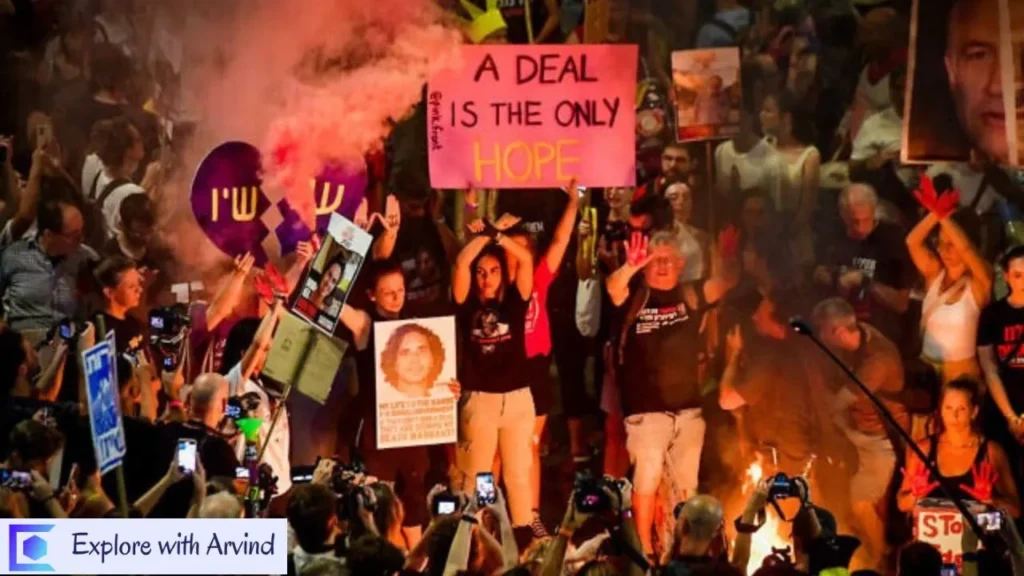Netanyahu US proposal: Israel Backs US Efforts for Hostage Release and Ceasefire, While Hamas Rejects Terms
Following an extensive three-hour dialogue with U.S. Secretary of State Antony Blinken in Jerusalem on Monday, Prime Minister Benjamin Netanyahu issued a public declaration of support for the most recent U.S.-proposed “bridging initiative.” This plan, put forth to Israel and relayed to Hamas after last week’s discussions in Doha, represents a critical juncture in the ongoing conflict.
In a formal statement released in both Hebrew and English, the Prime Minister’s Office reaffirmed Israel’s endorsement of the American proposal concerning the release of hostages, emphasizing that Israel’s security imperatives remain a top priority. “The Prime Minister reiterated Israel’s commitment to the current American proposal on the release of our hostages, which takes into account Israel’s security needs, which he strongly insists on,” the statement read. This public affirmation marks Netanyahu’s first overt approval of the latest U.S. framework.
Over the weekend, Israel had responded with measured optimism to the new U.S. plan. The Prime Minister’s Office had then indicated that the proposal “contains components that are acceptable to Israel.” However, by Sunday evening, Hamas had outright rejected the U.S. proposal, accusing Netanyahu of introducing “new conditions and demands” to deliberately obstruct negotiations and prolong the conflict in Gaza. Hamas further alleged that the U.S.-backed text was aligned with Israeli demands.

The American proposal, crafted to finalize a hostages-for-ceasefire agreement by the week’s end, aims to resolve contentious issues, including the continued presence of Israeli forces along the Gaza-Egypt border and in the Netzarim Corridor in central Gaza. Notably, the proposal does not include provisions for a sustained Israeli presence in the Philadelphi Corridor on the Egypt-Gaza border, nor does it establish a mechanism in central Gaza to prevent the return of armed Hamas militants to the northern regions of the Strip—points Netanyahu has reportedly insisted upon.
According to reports from the Lebanese newspaper Al-Akhbar on Monday, Israel agreed to incrementally reduce its military presence in the Philadelphi Corridor, while Egypt agreed not to impose a timeline for the complete withdrawal of troops. Despite this, Egyptian officials have reportedly insisted that a full withdrawal should occur as soon as possible. Egypt has also urged U.S. negotiators to expedite the delivery of equipment designated to secure the border, pledging to “ensure that there are no tunnels operating under it” that could facilitate the smuggling of arms into Gaza.
Beyond the demand for a sustained Israeli Defense Forces (IDF) presence along the Egypt-Gaza border and a mechanism to prevent Hamas fighters from moving northward within Gaza, Netanyahu has also maintained that Israel must retain the right to resume military operations against Hamas to achieve the dual objectives of securing the release of all hostages and dismantling Hamas.
The details of how the U.S. “bridging proposal”—which remains unpublished—intends to address these concerns are unclear. During his meeting with Blinken, described by his office as “positive,” Netanyahu committed to sending his top negotiators to a summit in Cairo later this week, as reported by an Israeli official to The Times of Israel. The delegation will be led by Mossad Director David Barnea, Shin Bet Chief Ronen Bar, and IDF Hostage Negotiator Nitzan Alon.
Earlier on Monday, President Isaac Herzog, speaking before his meeting with Blinken, attributed the stalled hostage negotiations to Hamas’s intransigence. “People have to understand it starts with a refusal of Hamas to move forward,” Herzog stated, while expressing hope that the negotiations mediated by international intermediaries would advance.
Blinken, characterizing the moment as pivotal, underscored the urgency of the situation: “It’s a decisive moment, probably the best, maybe the last opportunity to get the hostages home, to get a ceasefire, and to put everyone on a better path to enduring peace and security.” However, he stopped short of directly blaming Hamas, instead emphasizing the need for all parties to avoid actions that could derail the process. “It’s time for it to get done,” Blinken stressed, “It’s also time to make sure that no one takes any steps that could derail this process… that could escalate the conflict to other places and to greater intensity.”
Concluding his remarks, Blinken issued what was widely interpreted as a veiled message to Netanyahu: “It is time for everyone to get to yes and to not look for any excuses to say no.”
Blinken was scheduled to meet with Israeli Defense Minister Yoav Gallant in Tel Aviv later on Monday before continuing his diplomatic efforts in Egypt.
Muchas gracias. ?Como puedo iniciar sesion?